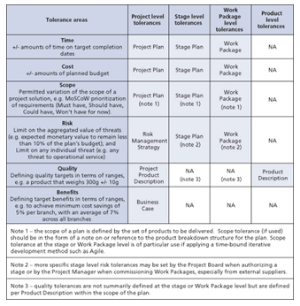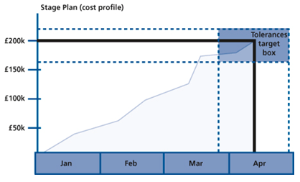PRINCE2 2009 - Directing Projects with PRINCE2 part 9
of the Cabinet Office under delegated authority from the Controller of HMSO.
Project Board duties and behaviours
Delegate effectively
Project Board members must delegate effectively, using the PRINCE2® organizational structure and controls designed for this purpose.
Several aspects of PRINCE2 are designed to promote effective delegation, e.g.:
- The well-proven framework of roles and responsibilities in the project management team
- Plans designed to meet the needs of managers at different levels
A key feature of the method in this respect is the implementation of management stages - delegating the day-to-day management of the project to the Project Manager on a stage-by-stage basis.
PRINCE2 projects are divided into a succession of management stages (time-slices which do not overlap) and this provides benefits both in terms of planning and progress control.
The ‘stage contract’
The best way to understand how PRINCE2 expects the Project Board to delegate the management of stage activity to a Project Manager is to view the Stage Plan as a ‘notional contract’. The terms of this notional contract are outlined below.
The stage contractThe Project Board undertakes, collectively, to:
- Provide overall direction
- Commit the resources in the plan
The Project Manager undertakes, subject to approved tolerances, to:
- Deliver the stage products
- Meet the product quality criteria
- Deliver within the stage budget
- Meet the target completion date
Delegating in this manner entails a degree of trust between Project Board members and the Project Manager, but PRINCE2 also provides checks and balances:
- The Project Board will normally require the Project Manager to produce Highlight Reports at intervals throughout the stage to confirm that the stage remains on track
- The Project Board members may employ Project Assurance measures to confirm that their various stakeholder interests are being safeguarded at the working level (e.g. part-time assurance roles or periodic independent health checks)
With these arrangements, the PRINCE2 project proceeds to completion as a series of stage contracts, minimizing the formal participation required of the Project Board.
However, this pattern can only work if there is also an understanding of how the Project Manager must behave if things do not go to plan, i.e. if an exception arises - covered in section the section covering ‘Exceptions and escalation’.
The same contract analogy can be applied to the Project Plan.
Exceptions and escalationThe way PRINCE2 handles ‘exceptions’ (i.e. departures from approved plans) depends on the implementation of tolerances. Tolerances are the permissible deviation above and below a plan’s target for time [see 'The Complete Time Management package'] and cost without escalating the deviation to the next level of management. There may also be tolerance levels for quality, scope, benefit and risk. Tolerances are applied at project and stage level and may also be implemented at the level of individual Work Packages.
If tolerances are not implemented (‘zero tolerance’), Project Managers have no clear measure of discretion if things do not go to plan - and however they react, there is likely to be criticism:
- If every minor exception is escalated to the Project Board, the Project Manager is merely monitoring the work and making no effort to implement corrective action - clearly unsatisfactory from the Project Board members’ point of view. In effect, the Project Board is having to do the Project Manager’s job
- On the other hand, if the Project Manager carries on working to put things right, implementing corrective actions, there is the risk that Project Board members will see this as exceeding the Manager’s (unwritten) discretion - and question why the problems were not escalated earlier: the Project Manager is seen as taking on the Project Board’s role in this instance
Diagram 1 describes where tolerances may be usefully applied and shows in which management product they are documented.
Diagram 1
Employing tolerances at stage level is essential to the way the Project Board delegates and empowers the Project Manager, and to the exception management process. Stage tolerances provide a defined area of discretion within which the Project Manager can be left to manage. The rule is that if the Project Manager forecasts that the stage cannot be completed within the agreed tolerances, an exception must be escalated to the Project Board.
The Project Board should be informed (or Project Assurance should be consulted) of any circumstances where tolerances could potentially be exceeded but forecasts suggest that the stage can be recovered.
Tolerances for budget and schedule are illustrated in diagram 2. In this example, the budget tolerance is £160k to £220k and the time tolerance is +/- 2 weeks. (Note: the plus and minus values do not have to be the same.) As long as the stage is forecast to be completed within these tolerance targets, the Project Manager does not need to seek additional approvals from the Project Board.
Diagram 2
When an exception does occur, the Project Manager escalates, initially, in the form of an Exception Report. The Exception Report serves to alert Project Board members to the situation and outline any different responses that are available - recommending a way forward if possible. Once the way forward has been agreed, the Project Manager may be asked to produce an Exception Plan. Using the contract analogy again, escalation is necessary because the current stage contract is no longer viable and must be replaced as soon as possible by a new ‘contract’ in the form of an Exception Plan.
Setting aside the problems that may have caused the situation to arise, raising an exception is evidence of good project management and Project Board members should, wherever possible, respond positively.
It is not unusual for the Project Board members to be the first to recognize an exception, e.g. when changes arise in the wider programme or business environment that will have a significant impact on the project in question. In this context, it is the responsibility of the Project Board to alert the Project Manager - but the exception planning approach is otherwise the same. Should the exception relate to project level tolerances, the Project Board will need to escalate to corporate or programme management as it means that the project is forecast to go beyond the authority given to the Project Board.
All references above are in Directing Successful Projects with PRINCE2 unless stated otherwise.
PRINCE2® is a Registered Trade Mark of the Office of Government Commerce in the United Kingdom and other countries.
Managing Successful Projects with PRINCE2 - 2005 edition
Managing successful Projects with PRINCE2 – 2009 edition
Directing Projects with PRINCE2.
plus:
The Complete Project Management package.
And much more besides - at a fantastic price.





